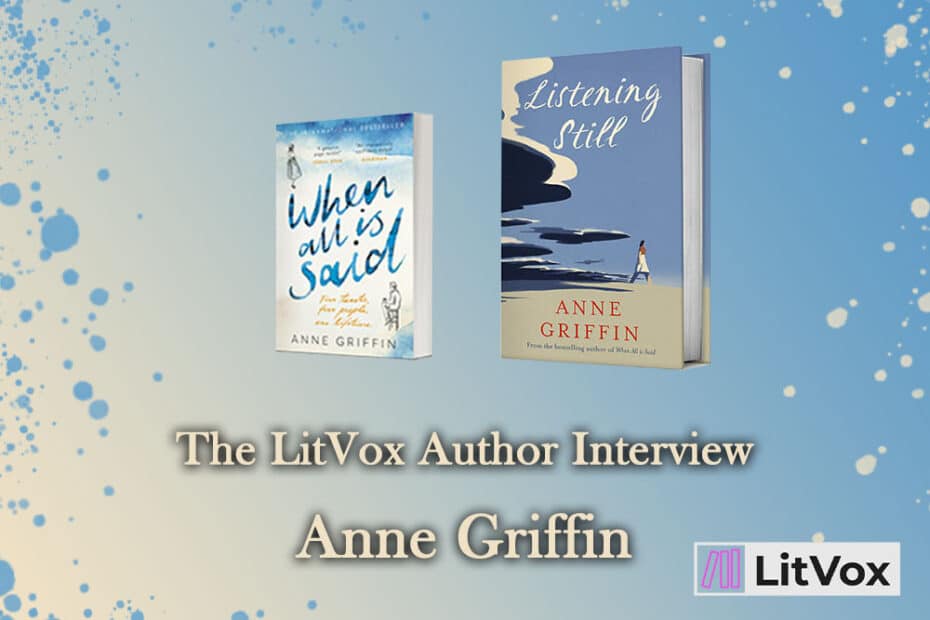LitVox is a project driven by a passion for books. Here you’ll find wonderful gifts, personalised, tailored reading recommendations and up-to-the-minute news and reviews from the publishing world. If you’re an artist, bookseller, author or just a fellow book-lover, you can get involved with the LitVox project. We’d love to hear from you.
The LitVox Author Interview: Anne Griffin

Anne Griffin’s debut novel When All is Said was released back in 2019 to rapturous acclaim. Poignant, sad, tender, brilliant…. reviewers exhausted superlatives describing it. Suffice to say, if you haven’t read it yet, you’re missing out. Griffin’s second novel, Listening Still, was released earlier this year. The premise is fascinating; Jeanie Masterson, daughter of the local undertaker in a small Irish town, can hear the final wishes of the recently dead.
Both novels share a deep understanding of the intricacies and contradictions of Irish rural life, and both books convey the beauty and profundity of the seemingly small life events that define us. A few months on from the publication of Listening Still, Anne Griffin spoke to LitVox about her favourite books, the ideas behind her novels and what’s she’s working on next.
The premise of Listening Still revolves around Jeanie’s ability to talk to the recently dead. It’s a strange, beautiful, slightly eerie concept. Was there a story or concept that inspired it, or have you been carrying this idea around for a while before putting pen to paper?
The idea of setting Listening Still in a funeral home was definitely knocking around my brain for many years. But allowing the main character to talk to the dead came later, in fact long after I had started the book. I can’t tell you which draft number I was on, there were many, but I recall a moment when I typed out a line of dialogue from one of the clients in Jeanie’s care, and I sat back and thought: ‘Oh, so this is what I’m doing now.’ It seemed it had taken the non-creative side of my brain quite a while to catch up with something the creative side had kept secret for some time. And while I had fun writing it, sometimes the weight of what these people had come back to say to Jeanie felt daunting. Their message changed quite a bit as I edited the novel, and some of the characters didn’t make the cut at all in the end.
One of the best things about When All is Said is the portrayal of the complexity, intricacy and contradictions of rural Irish life. Is there a particular author who conveys rural Irish life authentically in your opinion?
There are so many, but I think John McGahern is the out and out best. He catches the character of rural life in its beauty and starkness so very brilliantly. I’ve often stopped mid-passage to think about what he has said. I then go back and reread it, to appreciate the fearlessness in his writing. Despite how he was treated by the institutions in Ireland at the time, he was willing to write what he saw to be true, no matter how ugly. He was a brave, gentle, and kind writer who suffered greatly because of his genius. The Barracks remains one of my favourites of his novels.
You spent a long time as a Waterstones bookseller (so did most of the LitVox team). Is there a go-to book that you recommend to pretty much everybody?
I was indeed a bookseller. It was a time of great happiness for me. A time in which I worked with like-minded people who amazed me with their talents as fledgling writers and artists. I was in awe of them. In terms of published writers, I remember being wowed by Mike McCormack and Colm Tóibín when they first came on the literary scene. Alice Hoffman and Carol Shields were also great favourites. But I guess the book that I, to this day, recommend the most is Richard Russo’s: Nobody’s Fool. I fell in love with the main character Donald Sullivan, who is crochety and cantankerous and who makes me laugh so much. Russo does small town America very well. He’s great at showing just how a place works through the idiosyncrasies of its characters.
What are you currently reading? Is It any good?
I’m currently working my way through Anne Tyler’s back list. Some I’m re-reading, some I’m reading for the first time. ‘Good’ doesn’t do this woman justice, her writing is simply outstanding. Deep, in-depth explorations of people, showing us their wounds, their sadness, their quirks. She is helping me understand how to create atmosphere even when writing the ordinary. She is teaching me how to get the everyday things we do onto the page in a compelling way. She is the queen of ‘show don’t tell’. Right now, I’m on Dinner At The Homesick Restaurant, but I would recommend each and every one of her novels – get the list, stick a pin in it and you’ll be sure to find a work of brilliance. None disappoint.
Is there a book you think deserves to be more widely read?
There are a couple of writers who I think should be read more widely, particularly Mary Lawson of the Crow Lake trilogy, although not really a trilogy, all three can be read independently. Her new novel: A Town Called Solace was longlisted for The Booker this year and is really great. Also, an American writer and actor, Ron McLarty, who died in 2020, particularly his earlier novels: Traveller, Art In America and The Memory Of Running. All excellent, atmospheric, works with brilliantly drawn characters.

What’s the most important thing one needs to write well?
The understanding that it takes time and a lot of editing, and patience with oneself. I’m exceptionally impatient so this is the hardest thing for me. I want to hit the finish line of the first draft far quicker than perhaps I should. But I keep telling myself once I do, I’m into the nice bit, the crossing out, the moving whole scenes from one place to another, the finding out what is the purpose is of that character I stuck in on page 56. And I love when I eventually, often much later in the process of a book than most people might imagine, finally figure out the reason for me writing this novel in the first place. I feel calm then, totally in control. It’s a time when I really fall in love with what I have created.
Was there ever a movie or series that was better than the book? Or anything that came close?
Great question. I can’t really think of one. Although, I can say that I thought The Sisters Brothers was as fantastic on screen as it was on the page. Bravo to Patrick DeWitt who wrote the novel and Jacques Audlard who directed the movie.
When All is Said has attained modern classic status and Listening Still continues to sell well and has been lauded by critics all over the place. Are you working on anything at the moment or is that all very hush-hush?
Your praise is very kind and much appreciated. I’m working on book three. I don’t tend to talk about anything I’m currently writing before I get the final sign off from the editors. The main reason is that in the early stages I may say: The book is about this, and then five drafts later, realise it isn’t about that at all. I don’t therefore want to jinx myself or back myself into a corner. It’s best just to say very little other than: Yes, I’m working on something. But I will say, writing the third book is a lot easier than the second, a cliché perhaps, but one that turns out to be very true in my case.




